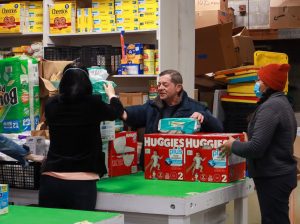On first glance, the East Durham Market seems like a run-of-the-mill corner store. Tucked into a large, red brick building, the market’s exterior is quaint and unassuming. Inside, metal shelves are stocked with essentials ranging from ketchup and pancake mix to peanut butter. Refrigerators lining the side wall hold wicker baskets of peppers, cabbage and squash. Some shelves remain empty, and business—for the time being—is slow.
Located at 306 South Driver Street in the heart of East Durham, the small market has a big mission: reducing food insecurity in a neighborhood where residents face high poverty rates and little access to healthy foods.
Last month, the Durham County commissioners allocated $500,000 to Communities in Partnership (CIP), the nonprofit behind the East Durham Market, to support the new grocery store.
The market first opened its doors in late July, receiving funding from grants, individuals, foundations and corporate donors. It’s the latest venture for CIP, which was founded in East Durham in 2011 following a neighborhood tragedy.
“There was a shooting in our neighborhood in the fall…and so we came together as neighbors,” said Camryn Smith, the nonprofit’s co-founder and executive director.
Over time, the nonprofit evolved, launching an affordable housing initiative, a mentorship program for entrepreneurs of color, a monthly food co-op and a farmers’ market.
“Farmers’ markets tend to contribute to gentrification,” Smith said. “So we decided to pivot from a farmers’ market concept to a storefront concept.”
The East Durham Market is a “community-accountable” grocery store, according to County Food Security Coordinator Mary Oxendine.
“‘Community-accountable,’ meaning CIP has a close relationship with the community that it sits within,” Oxendine said. “They frequently and proactively connect with community members to get their input on what kinds of things they want to see happen in the community.”
One way the market engages with the community is by sourcing its meat and produce from local, minority-owned farms — including Fourtee Acres, 4-Ever Vista Farms and Delmar Farm.
The nonprofit is also committed to providing living wages for its grocery store workers, who mostly hail from within the neighborhood. “For the folks that are able to work there, I think it would make a significant impact on their ability to take care of themselves and on their family,” Oxendine said.
The Durham County Board of Commissioners’ recent grant to East Durham Market comes from the American Rescue Plan Act, federal legislation that distributed funds to local governments following the COVID-19 pandemic.
“This was a once-in-a-lifetime opportunity,” said County Commissioner Wendy Jacobs. “For local governments all over the United States, the closest thing I can really say to this is the New Deal back in the 1930s.”
Smith said her nonprofit will use the funding to help market customers stretch their buying power through a “Double Bucks” program. Double Bucks is a Durham initiative that effectively doubles the buying power of residents enrolled in federal food assistance programs.
In the coming months, the market’s owners also hope to lower prices for their customers by negotiating with large wholesale producers. Still, they remain committed to paying their local minority farmers fair prices for their goods. “They’ve already been extracted from enough,” Smith said.
For now, the East Durham Market is in its “soft opening” phase, typically serving just 10 customers a day. Inside, it’s often silent — save for the muffled shouts and laughter reverberating from the elementary school playground across the street.
But by early next year, its owners hope to finish stocking the market’s shelves, source local dairy, start selling products in bulk and transform the small store into a vibrant community gathering space.
“We want it to be a community space as far as our people can come into, and kind of build relationships while they’re getting their food,” Smith said.
Above: Photo of East Durham Market by Maddie Wray — The 9th Street Journal
Mia Penner










